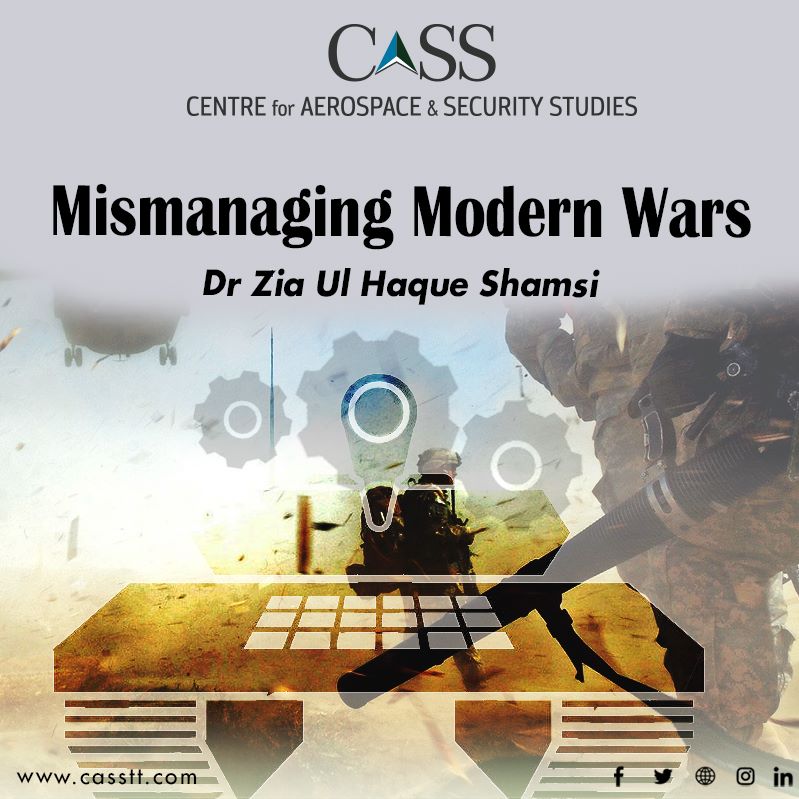There are numerous study centres, think tanks, and departments in every university all over the world, teaching about conflict management, resolution, crisis management, prevention, etc., without any worthwhile contribution to how to avoid modern wars. Nearly 40 percent of the world’s population is facing conflicts, wars, or war-like situation with no solution in sight. The stronger nations do not think twice before initiating a war against an Unequal Military Power (UMP), at times, without any consideration of the outcome. The Iraq War (2003-11) and the war in Afghanistan (2001-21) are examples of 21st Century wars, which were grossly mismanaged and continued for decades without any logic.
Perhaps, it is time that we start to invest in ‘War Management Studies’ instead of ‘Conflict Management’ or ‘Crisis Management,’ because it is the mismanagement of conflicts and crisis that leads to wars, and it is the mismanagement of wars that is causing the death and destruction of civilians and non-combatants. Therefore, it is necessary to study war management as a subject of Social Sciences and analyse the impacts of often irrational and ill-considered decisions by policymakers to wage wars without a well thought out minimum-damage strategy and a sound exit strategy.
Also, there is no need to go too far back in history because within two decades of the 21st Century, there have been a number of wars between UMPs which were unnecessary and have virtually destroyed a number of relatively weaker countries with no plausible gains for the aggressors, except an increase in sales of the war machines produced by their Military Industrial Complex (MIC).
The primary reason for this proposal (if it is already happening, it needs to be expanded) is to insist on minimising the damage and avoid prolonging war due to the absence of sound war management of which the exit strategy forms an important part.
Let’s have a look at the two-decades long Afghan War that started in the aftermath of the tragic incidents of 9/11. Initially, the objectives were to eliminate al-Qaeda from Afghanistan to ensure that Global War on Terror was won, and there was no danger of terror activities, particularly against the United States. However, the war continued even though al-Qaeda was neutralised much earlier than anticipated by the US. Two decades later, President Biden withdrew from Afghanistan after the US had signed an Agreement with the Taliban in Doha-Qatar on February 29, 2020, under the Trump Administration.
The post-9/11 Afghan war was grossly mismanaged in terms of its initiation, execution, continuation, and even culmination. The US failed to evaluate the resolve of the Afghan people that they do not accept foreign occupation and had defeated two global powers of the time earlier: Great Britain and the Union of Soviet Socialist Republics (USSR). The continued war did not have a well-thought or clearly defined political or military objectives that were doable or preferrable. The fight continued for years and years against the same ill-equipped but determined fighters until the US and NATO decided to call it a day. Likewise, the hasty withdrawal of world’s best armed forces demonstrated clearly that the occupation was without a purpose and unethical.
The ongoing Yemen War also presents a similar picture. The primary objective of reinstalling the Hadi government was quickly achieved, yet the war is continuing in its ninth year, with the worst famine and gross human rights violations.
The Russia-Ukraine War, which is not a war between two UMPs, because Ukraine has the moral, military, and financial support of NATO as well non-NATO allies. Therefore, I refer to this war as one between Near-Equal Military Powers (NEMPs). The war has now entered its second year with no end in sight, perhaps because the US-led NATO does not want an end to this war, and therefore, supporting Ukraine to stand firm and keep fighting for which the MIC is happy to provide unabated support. The US’ objective is to keep Russia embroiled in an expensive war, similar to the first Afghan War. Russia, on its part, is perhaps mismanaging the war by prolonging it, even though most of the ethno-Russian bordering region is already annexed and administered autonomously.
To understand the enemy design and overcome one’s weaknesses is perhaps the most important aspect after the first bullet has been fired. Therefore, it is more important to study ‘War Management’, so that the politico-military objectives are accomplished with minimum damage to the warring nations, particularly innocent non-combatants.
Dr Zia Ul Haque Shamsi is the author of ‘Nuclear Deterrence and Conflict Management Between India and Pakistan’ and ‘South Asia Needs Hybrid Peace.’ He is presently working as Director (Peace and Conflict Studies) at the Centre for Aerospace & Security Studies (CASS), Islamabad, Pakistan. He can be contacted at: [email protected]





